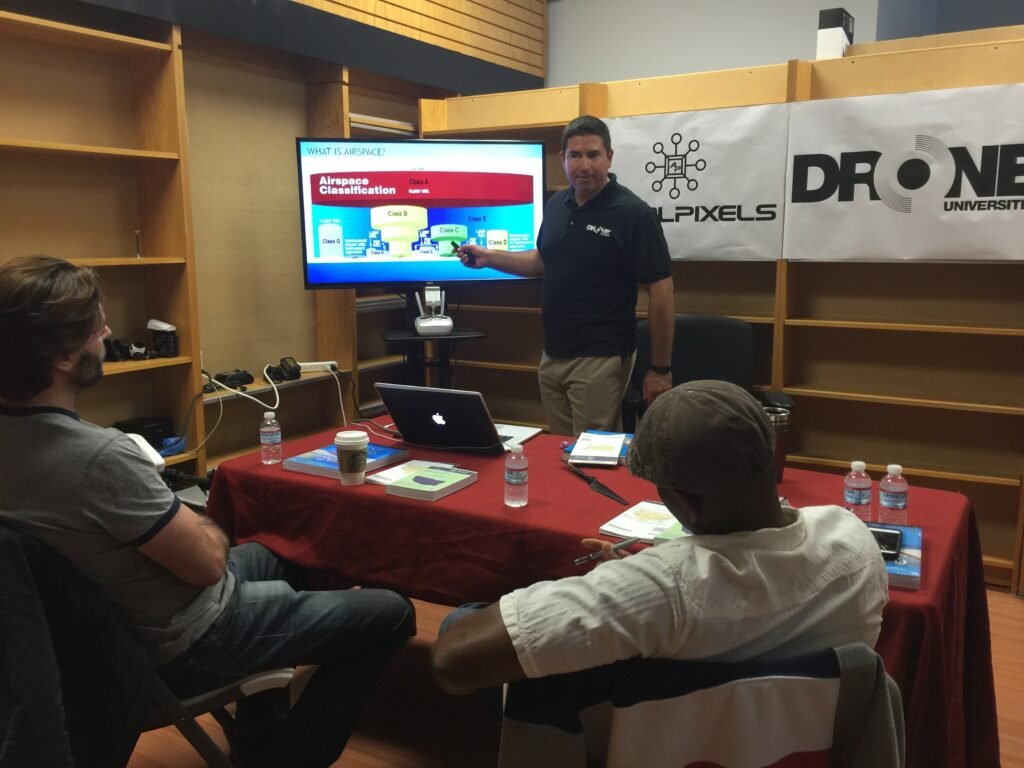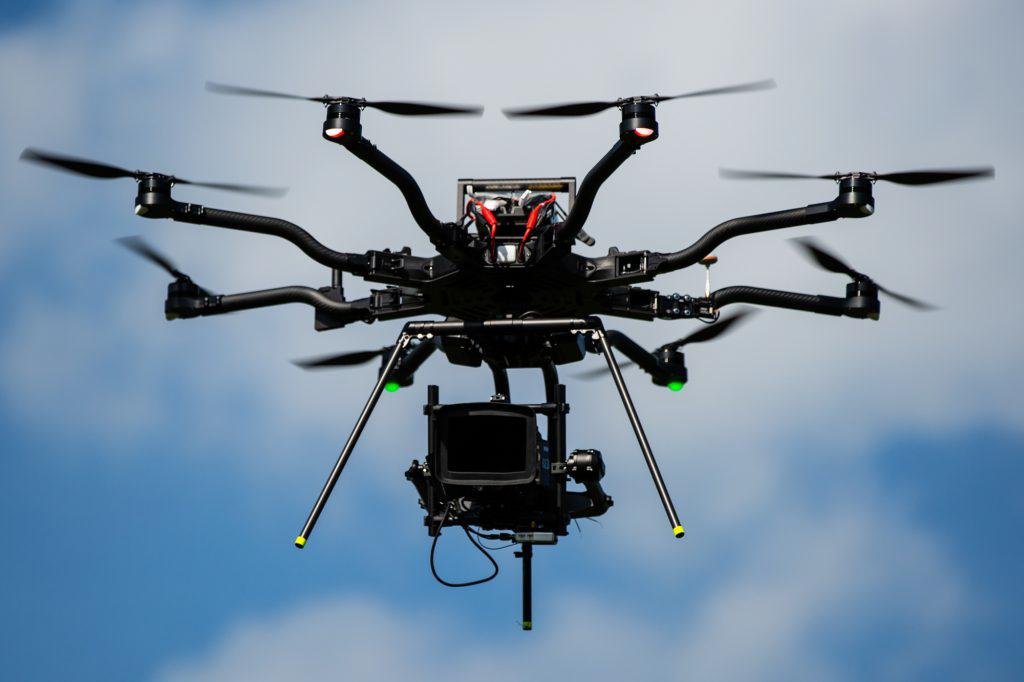Have you ever looked up at the sky and seen a drone flying above, capturing amazing videos or helping with search and rescue? If that sounds exciting, you’re not alone. Drones are everywhere now—from movie sets to farms to busy construction sites. The best part? You can make a career out of flying them!
But how do you start?
To become a professional drone pilot, you need more than just a drone. You need real training, expert guidance, and the right certifications. That’s where Drone Universities comes in.
With over 150+ years of combined aviation and drone experience, Drone Universities has trained thousands of students to become FAA-certified drone pilots. They make the learning process easy and fun, even if you’ve never flown before.
Whether you’re into photography, agriculture, law enforcement, or just love flying drones, this guide will walk you through every step.
What Is a Drone and Why Are They So Popular Today?
A drone, also called a UAV (Unmanned Aerial Vehicle), is like a flying robot you control from the ground. Some drones are as small as your hand, while others are large enough to carry cameras or sensors. Most are controlled using a remote or a smartphone, and some even fly themselves using GPS.
So, why are they everywhere?
- They save time and money – Drones can inspect buildings or crops without needing people to climb ladders or walk fields.
- They go places humans can’t – In disasters or dangerous places, drones are lifesavers.
- They get amazing footage – Drones capture bird’s-eye views for movies, real estate, and more.
Drones are tools that can do so many things—and the demand is growing fast. If you know how to fly one well, you’re already ahead of the game.
The Booming Drone Industry: Jobs, Growth, and Opportunities
Let’s talk numbers. Experts say the drone industry will create over 100,000 new jobs and bring in more than $82 billion to the U.S. economy in the next 10 years. And most of those jobs will pop up in just the first three years!
Here are just a few places where drone pilots are needed:
- Farms for checking crops using special cameras
- Film sets for stunning aerial shots
- Law enforcement for accident scenes and searches
- Construction sites for mapping and safety checks
- Insurance companies for inspecting damage
Drone companies are growing fast, and they need trained people now. If you start training today, you’ll be ready for these big opportunities tomorrow.
Why Choose Drone Universities for Your Drone Training?
There are lots of online drone courses out there—but Drone Universities is different. They don’t just give you videos and say, “good luck.” They give you real-world training, in person, with experts by your side.
Here’s what makes Drone Universities stand out:
- FAA Certified Instructors – Learn from real pilots, not YouTube personalities.
- Hands-on Training in 50+ Cities – No matter where you live, there’s likely a class near you.
- Training 7 Days a Week – They work around your schedule.
- Career Placement Support – They don’t just train you—they help you find a job.
Plus, they offer a 100% FAA compliant curriculum and small class sizes, so you get personal attention.
What Is the FAA Part 107 License and Why Do You Need It
If you want to fly drones for money in the U.S., you need something called the FAA Part 107 license. It’s a rule from the Federal Aviation Administration (FAA) that says commercial drone pilots must pass a special knowledge test.
This test covers:
- Airspace rules
- Weather conditions
- Emergency procedures
- Drone laws and safety
Sounds tough? Don’t worry. Drone Universities will get you ready. They teach you everything you need to know, using simple lessons and practice tests. Many students say they passed on their first try—thanks to their training.
Without this license, flying a drone for business is illegal. With it, the sky’s the limit!
Step-by-Step: How Drone Universities Prepares You for the FAA Part 107 Exam
The Part 107 exam might sound scary, but Drone Universities makes it easy with a step-by-step training plan. Here’s what the process looks like:
- Ground School Training
You’ll learn the rules of the sky, how to read charts, and how to fly safely. - Practice Quizzes
You’ll take sample tests to get used to the real exam. - One-on-One Help
If you’re stuck, your instructor will help you until it clicks. - FAA Practice Exam
You’ll take a full-length test to check your skills. - Exam Day Support
They’ll help you register for the real test and make sure you’re ready.
Advanced Drone Skills: Training Beyond Part 107
Getting your FAA Part 107 license is a big first step—but it’s only the beginning. If you want to become a true expert in the drone world, you need to keep learning. Drone Universities understands this, which is why they offer advanced training that goes far beyond the basics.
After you earn your license, Drone Universities gives you the tools to stand out in the job market. They teach you how to fly like a pro, collect important data, and work in different industries. Whether you want to shoot videos for big clients or map out farmland, they have the training you need.
Here are some of the advanced skills you can learn:
- Aerial photography and videography techniques
- Mapping and GIS (Geographic Information Systems)
- Construction site surveys and inspections
- Cinematic flight maneuvers for filmmaking
- Programming flight paths and autonomous missions
These skills open doors to high-paying careers. Drone Universities’ instructors are real industry professionals. You’ll learn from pilots who work with top companies like National Geographic, Discovery Channel, and more.
When you train with the best, you become one of the best.
Specialized Courses Offered by Drone Universities
One of the things that makes Drone Universities stand out is their wide range of specialized courses. These courses are designed to match your personal goals and the industry you want to work in.
Here’s a look at some of the most popular programs:
- Drones in Agriculture – Learn how to boost crop health using multispectral imaging and precision flights.
- Drone Photography/Videography – Discover how to capture stunning photos and videos that wow clients.
- Advanced GIS and Mapping – Understand how to collect, analyze, and use data for land surveys, construction, and city planning.
- Construction and Inspection – Learn to reduce errors, save money, and improve safety with aerial inspections.
- Search and Rescue – Get trained in life-saving drone operations for emergency teams.
- Public Safety and Transportation – Use drones to inspect roads, bridges, and public works projects.
- Drones in Law Enforcement – Discover how drones can help with crime scene documentation, surveillance, and accident investigation.
Each course is taught by experts in that field. Whether you’re looking to start your own drone business or get hired by a company, these courses give you the confidence and skills to succeed.
And yes—each of these programs includes hands-on learning. You won’t just watch videos. You’ll actually fly, collect data, and practice real-world missions.
Hands-On Drone Training: Why It Matters More Than Videos
You can watch all the YouTube videos in the world, but you won’t truly learn how to fly until you’ve got your hands on the controls. That’s why Drone Universities believes in hands-on training. Their students don’t just sit in a classroom—they fly real drones in real environments.
Here’s why hands-on training works better:
- Muscle memory – You learn to react fast and fly smoothly.
- Real-world experience – You practice in different conditions: wind, rain, and open spaces.
- Confidence boost – You’ll feel ready to handle any job once you’ve flown with an instructor.
- One-on-one feedback – Instructors help correct mistakes and improve your flying right on the spot.
Drone Universities has a low student-to-teacher ratio, so you’re never lost in a crowd. Instructors are with you every step of the way.
And remember—these aren’t just hobbyists. They’re FAA-certified pilots with decades of experience. They’ve flown drones in combat zones, corporate shoots, and wildfires. You’ll learn tricks you can’t find online.
This is what sets Drone Universities apart from online-only schools. You walk away with real skills, not just a certificate.
Drone Universities’ Nationwide Reach and Flexible Schedule
One major benefit of training with Drone Universities is their flexibility. No matter where you live, chances are good that Drone Universities has a class near you. They offer hands-on drone training in 50+ cities across the United States.
Busy schedule? No problem. They offer classes 7 days a week, including weekends. Whether you work full-time or are a student, they’ll help you find a time that works.
You can also request a class in your city if it’s not already on the schedule. They’re committed to bringing drone training to every corner of America.
This means you don’t need to move across the country to get top-tier training. Drone Universities brings it to you.
Why choose a local course from a lesser-known provider when you can train with a national leader in drone education?
And don’t forget: their FAA-compliant curriculum and certified instructors mean you’re getting the best training possible—right where you live.
Career Support: From Classroom to Job Placement
Once you complete your training, what’s next?
At Drone Universities, your journey doesn’t stop when class ends. They offer career placement support to help you land a job or start your own drone business.
Here’s how they help:
- Resume and portfolio building – Show off your drone photos, videos, or data projects.
- Job board access – Find job listings just for Drone Universities graduates.
- Industry connections – Network with top employers looking for trained drone pilots.
- Interview prep – Practice how to talk about your skills and certifications.
- Business coaching – Want to go solo? They’ll help you set up your drone service business.
The drone job market is growing, but it’s competitive. Having a team that supports you—even after you graduate—is a huge advantage.
This is where Drone Universities really shines. They care about your success, not just your tuition.
With their help, you’ll go from student to certified drone professional—and maybe even boss—faster than you thought possible.
There’s nothing more powerful than hearing from real students who turned their drone dreams into real careers. Drone Universities has helped thousands of people—just like you—become certified pilots and launch exciting jobs in many industries.
Take Jason from Texas. He started with zero drone experience. After finishing his training, he landed a job with a construction company, using drones to inspect sites and improve safety. Within six months, he was leading a team and flying missions weekly.
Or meet Maria from California. She took the advanced aerial cinematography course. Today, she flies drones for commercials and indie films. Her footage has even been featured on national TV. She credits Drone Universities for giving her the skills and confidence to turn her passion into a career.
Graduates have gone on to work in:
- Law enforcement
- Agriculture
- Real estate
- Disaster response
- Environmental protection
- Energy and utilities
Each story starts with a simple step—signing up for training. With the right guidance, these students turned their interests into real, paying jobs.
And with Drone Universities’ career placement support, you don’t just get trained—you get connected to real opportunities.
How Drones Are Used in Different Industries
Drones are no longer just toys or camera gadgets. They’ve become powerful tools across almost every industry. If you’re wondering how drone skills can lead to real jobs, here’s a closer look:
Agriculture
Farmers use drones to monitor crops, check soil health, and spot problem areas. Multispectral sensors help boost crop yields and reduce waste.
Construction
Drones create detailed 3D maps, track progress, and inspect buildings for safety. They save time and money on large projects.
Public Safety and Law Enforcement
Police and fire departments use drones to manage traffic accidents, search for missing people, and keep officers safe during dangerous missions.
Cinematography and Photography
From weddings to movies, drones capture stunning aerial shots that once required helicopters. It’s a game-changer for creators.
Environmental Work
Scientists use drones to track wildlife, measure pollution, and monitor forests, rivers, and coastlines—all without disturbing nature.
Insurance and Inspection
After storms, insurance companies send drones to inspect roofs, power lines, and damage—cutting down time and keeping people safe.
As drones become more common, new jobs are opening up every day. And with the right training from Drone Universities, you’ll be ready to step into these roles.
How Much Does Drone Training Cost? Is It Worth It?
Drone Universities offers high-quality, hands-on training—and like anything valuable, there’s a cost. But think of it as an investment in your future.
Here’s a quick breakdown:
- FAA Part 107 Training (2 Days) – $2,500
- Advanced Aerial Inspections/Cinematography (1 Day) – $1,000
- GIS & Mapping, Agriculture, Law Enforcement, Public Safety Courses – $1,000 each
Compared to a college degree or tech bootcamp, this is a fast and affordable way to start earning money with a real skill.
And remember:
- Training is taught by FAA Certified Flight Instructors
- Courses are 100% FAA compliant
- You receive hands-on training (not just online videos)
- There’s a money-back guarantee if you don’t pass your FAA Part 107 exam
Plus, with job placement help, many students land paid gigs soon after finishing their courses.
So, is it worth it? If you’re serious about a career in drones, the answer is a big yes.
What Makes a Great Drone Pilot? Skills You’ll Learn
Flying a drone takes more than just a steady hand. Great drone pilots need technical skills, sharp thinking, and a professional attitude.
At Drone Universities, you’ll learn how to:
- Fly safely and legally under FAA rules
- Read airspace maps and understand weather conditions
- Operate commercial-grade drones in real-world conditions
- Capture professional-quality photos and videos
- Program automated flight paths for complex missions
- Work in teams or solo on real jobs
But beyond the tech, you’ll also build soft skills:
- Problem-solving – What do you do if your drone loses signal?
- Communication – How do you explain drone plans to clients or police?
- Planning – How do you organize a successful flight mission?
These are the kinds of skills employers want. And Drone Universities helps you build them from day one.
Common Myths About Drones and Drone Schools
There are a lot of myths floating around about drones. Let’s bust a few:
Myth 1: “I don’t need training—I can learn on YouTube.”
YouTube is great, but it won’t prepare you for FAA tests or real work. You need certified training to fly legally and professionally.
Myth 2: “Drone schools are too expensive.”
With Drone Universities, you get hands-on experience, expert instruction, and job support. It’s a small investment for a big future.
Myth 3: “The drone job market is too competitive.”
The truth? There’s more demand than supply. Trained drone pilots are needed everywhere—from farms to film sets.
Myth 4: “I’m too old to learn this.”
Drone Universities has trained students from age 16 to 65+. If you can use a smartphone, you can learn to fly a drone.
Myth 5: “Drones are just for fun.”
They’re fun, yes—but they’re also serious business tools. And they’re changing the world, one flight at a time.
Final Thoughts: Your Future as a Professional Drone Pilot
The drone industry is exploding with opportunity. Whether you want to start a new career, add a new skill, or build your own business—Drone Universities can help you get there.
With expert FAA-certified instructors, hands-on training, and flexible classes offered in over 50 cities, you don’t have to wait or travel far. You can start learning today, and be flying professionally tomorrow.
This isn’t just another class. It’s the start of a whole new chapter.
FAQs
1. How long does drone training take?
Most Drone Universities courses take just 1–2 days, depending on the level and topic. You can be trained and certified in under a week.
2. What kind of drone do I need to start?
You don’t need to bring a drone. Drone Universities provides professional drones for training purposes. You’ll learn on industry-standard gear.
3. Can I take courses online?
Drone Universities focuses on hands-on training. While some materials may be online, the core learning happens in person with expert instructors.
4. Do I really need the FAA Part 107 license?
Yes! If you want to fly drones commercially (for work or business), the FAA requires you to have this license.
5. What happens after I finish my course?
You’ll be prepared to pass your FAA test, fly professionally, and even get job support through Drone Universities’ career placement services.








